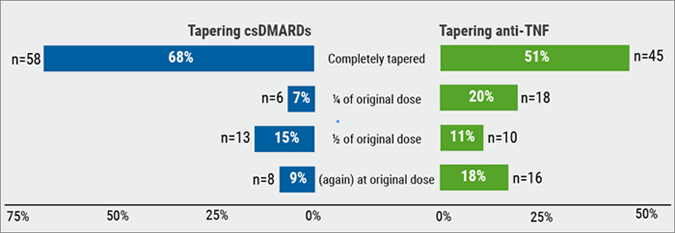Researchers randomly assigned 50 adults with lupus to receive usual care alone or in combination with a digital therapeutic intervention delivered via the Mymee app for 16 weeks. The app asks patients to enter daily information on their symptoms and log activity and diet information, then analyzes this data to provide tips on possible triggers for worse symptoms and offers telehealth coaching to modify the behaviors.
In per-protocol analysis, the 27 patients who used the app had significantly greater improvement than the 23 patients in the control group for 9 of 11 domains measured by three health-related quality of life tools: Brief Pain Inventory-Short Form (BPI-SF), Functional Assessment of Chronic Illness Therapy-Fatigue (FACIT-F), and Lupus Quality of Life (LupusQoL).
"The study demonstrates that it is possible to sort through the 'haystack' of factors which contribute to the severity and frequency of flares, and that it can be done 100% remotely, outside the doctor's office," said lead study author Dr. Faiz Khan, executive vice president of CityMD in Dix Hills, New York.
Compared to baseline, the intervention group had significantly better outcomes than the control group at 16 weeks on the FACIT-F (34% absolute improvement vs 1% decline).
The treatment group also had better outcomes on the BPI-SF measures of pain interference (25% improvement vs no change) and pain severity (13% improvement vs 6% decline).
In addition, the group that used the app had better LupusQoL outcomes for pain (13% improvement vs no change); fatigue (38% vs 13% improvement); emotional health (21% vs 4% improvement); physical health (17% vs 3% improvement); and burden to others (33% vs 4% improvement).
The effectiveness of the app depends on patients entering consistent and accurate diet, lifestyle and symptom information as well as the ability of the program to process large amounts of data to determine what factors over time may trigger symptoms, Dr. Khan, who has received financial stipends from Mymee Inc., said by email.
"This trial was not designed to assess whether similar results could be achieved by clinicians during in-person visits, however, given the time constraints faced by doctors and how much the success of the program depends on the relationship built between the patients and coaches and the weeks-long iterative process described, it is unlikely that these results could be achieved in a traditional medical office setting," Dr. Khan said.
Beyond its small size, another limitation of the study is that it didn't show any statistically significant differences between the intervention group and the control group in an intent-to-treat analysis, the study team notes. Six participants in the intervention group (24%) left the study early, as did one participant in the control group.
Another limitation is that online recruitment from lupus and autoimmune disease patient websites may have introduced selection bias, and the results may not be representative of all patients with systemic lupus erythematous, the researchers note.
"It did show improved quality of life for those who were randomized to the health-improvement intervention, which is very encouraging," said Dr. Karen Costenbader, a professor at Harvard Medical School and Lupus Program Director at Brigham and Women's Hospital in Boston.
"It is hopeful that it really was the intervention that improved healthy behaviors and quality of life for patients, but longer trials to make sure the effect is durable, as well as those with an attention control, meaning that the non-intervention group also feels that they are being watched more closely, will be necessary," Dr. Costenbader, who wasn't involved in the study, said by email.
By Lisa Rapaport
SOURCE: https://bit.ly/3pQmX9V Journal of Medical Internet Research, online October 20, 2020.
Posted on
Previous Article
« Retinal imaging may predict Alzheimer’s in those at genetic risk Next Article
Complete hemodynamic profiling tied to lower mortality from cardiogenic shock »
« Retinal imaging may predict Alzheimer’s in those at genetic risk Next Article
Complete hemodynamic profiling tied to lower mortality from cardiogenic shock »
Related Articles

January 4, 2024
Interview: Medicare’s first drug price negotiations: concerning?
January 18, 2021
No elevated risk for influenza AE in tofacitinib-treated RA patients

© 2024 Medicom Medical Publishers. All rights reserved. Terms and Conditions | Privacy Policy
HEAD OFFICE
Laarderhoogtweg 25
1101 EB Amsterdam
The Netherlands
T: +31 85 4012 560
E: publishers@medicom-publishers.com

